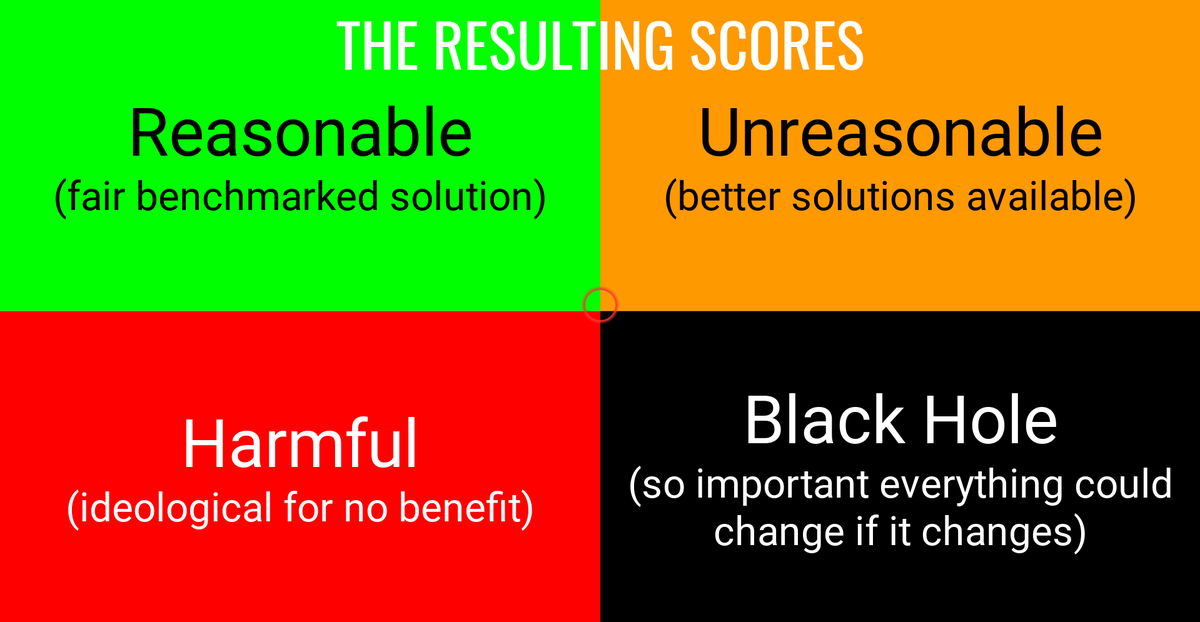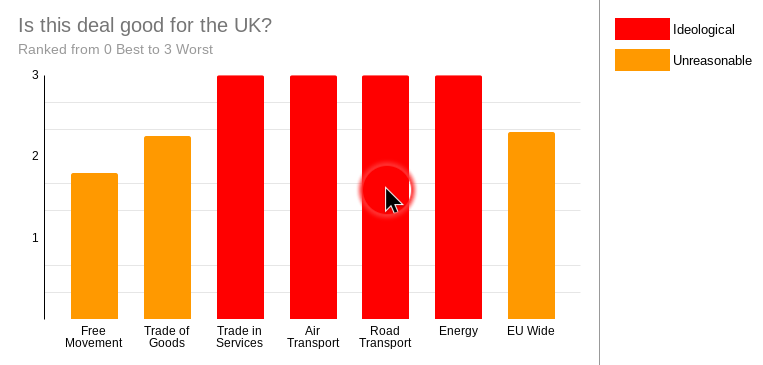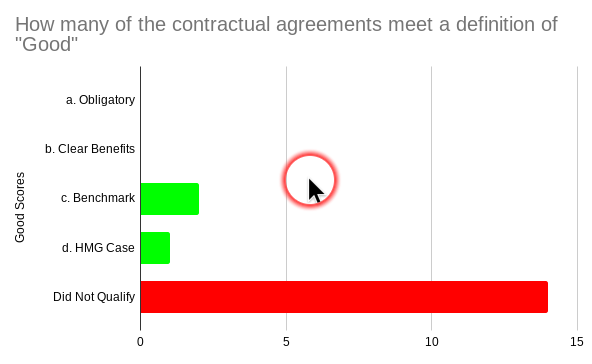To analyse the UK/EU deal, you must know:
1. Is it of Strategic Sense?
2. Is it what normal neighbours would do?
The answer, using an objective, evidence-based model, is
NO.
I'm a small account; please help me get data to the pro-Europe community by retweeting it.
1. Is it of Strategic Sense?
2. Is it what normal neighbours would do?
The answer, using an objective, evidence-based model, is
NO.
I'm a small account; please help me get data to the pro-Europe community by retweeting it.
The methodology is open source and attached in full at the end.
There are many ways the questions could be answered. This is one way.
Strategic Fit - Has an economic, strategic or other case been made? Is there a better way?
Is it normal for Neighbours - Aus/NZ Benchmark 1/
There are many ways the questions could be answered. This is one way.
Strategic Fit - Has an economic, strategic or other case been made? Is there a better way?
Is it normal for Neighbours - Aus/NZ Benchmark 1/
I take each section of the agreement and break it into its separate areas.
I add the evidence of what was said in 2016, based on the LSE Archive (since what is remembered is often inaccurate). 2/
I add the evidence of what was said in 2016, based on the LSE Archive (since what is remembered is often inaccurate). 2/
HMG has positioned this deal as
a gift to the UK,
comprehensive
and fulfilling 2016 promises
Objectively, based on evidence, none of these statements is true.
I'll look at each of them in turn: 4/
a gift to the UK,
comprehensive
and fulfilling 2016 promises
Objectively, based on evidence, none of these statements is true.
I'll look at each of them in turn: 4/
Is it a gift?
4/7 areas are ideological, actively harmful to the UK, and out of line with normal practice.
The other 3 areas are unreasonable - better options were available.
Massive impacts in Security, Defence, Tourism Financial Services have been swept under the carpet. 5/
4/7 areas are ideological, actively harmful to the UK, and out of line with normal practice.
The other 3 areas are unreasonable - better options were available.
Massive impacts in Security, Defence, Tourism Financial Services have been swept under the carpet. 5/
Is it Comprehensive?
Comprehensive means:
1. Few important points unanswered
2. None are sufficiently impactful to change the outcome of Brexit completely.
We can total those
But then it's subjective
1/3 unclarified, of which 1/3 are game-changers
Is that Comprehensive?
Comprehensive means:
1. Few important points unanswered
2. None are sufficiently impactful to change the outcome of Brexit completely.
We can total those
But then it's subjective
1/3 unclarified, of which 1/3 are game-changers
Is that Comprehensive?
Good for the UK?
Obviously, opinion, so definition:
1. The proportion of outcomes that are:
a) obligatory
b) have clear benefits
c) if b unclear, in the benchmark
d) if c is unclear, HMG made a case for Jobs, Food, Income not just ideology. 1/
Obviously, opinion, so definition:
1. The proportion of outcomes that are:
a) obligatory
b) have clear benefits
c) if b unclear, in the benchmark
d) if c is unclear, HMG made a case for Jobs, Food, Income not just ideology. 1/
Maybe you're thinking that my analysis is damning, yet out of line with what you're hearing or reading?
I wondered
This is a plot of how the deal works by section green for good, red for bad.
HMG only presented the first two
It's a "didn't tell the whole story" problem. 2/
I wondered
This is a plot of how the deal works by section green for good, red for bad.
HMG only presented the first two
It's a "didn't tell the whole story" problem. 2/
HMG has asked for Unity. What are the key unifying points?
Sadly I find almost nothing to unify around.
This isn't Brexit. It's a dog.
So I'll step away from what Brexit promised.
Instead ask, as a UK Trade Deal
What are the key points of difference from Aus/NZ?
Sadly I find almost nothing to unify around.
This isn't Brexit. It's a dog.
So I'll step away from what Brexit promised.
Instead ask, as a UK Trade Deal
What are the key points of difference from Aus/NZ?
Free Movement
The 90 days free and post 90 days Visa are in line with Aus/NZ.
But roaming charges, insurances, credit cards, pet passports - Aus/NZ did away with those because they unnecessarily added pain and cost.
HMG added them back in UK because? 1/
The 90 days free and post 90 days Visa are in line with Aus/NZ.
But roaming charges, insurances, credit cards, pet passports - Aus/NZ did away with those because they unnecessarily added pain and cost.
HMG added them back in UK because? 1/
Trade Goods
No Tariffs with the right % origin of components is consistent with Aus/NZ.
But they pool resources to bargain better; their fishing agreement helps them mutually protect pirating from outside. Frictionless trade is crucial, and they want it closer.
Not UK 2/
No Tariffs with the right % origin of components is consistent with Aus/NZ.
But they pool resources to bargain better; their fishing agreement helps them mutually protect pirating from outside. Frictionless trade is crucial, and they want it closer.
Not UK 2/
Trade Services
The new HMG "deal" with Europe would be unrecognisable in Aus/NZ, as would the lack of mutual recognition of qualifications.
Versus UK 80%, Aus is 67%, NZ is 66% services.
Both embrace services integration that HMG has discarded without explanation 3/
The new HMG "deal" with Europe would be unrecognisable in Aus/NZ, as would the lack of mutual recognition of qualifications.
Versus UK 80%, Aus is 67%, NZ is 66% services.
Both embrace services integration that HMG has discarded without explanation 3/
Trade Services Note
[note starts
I know Brexit is emotive. Fishing, despite wild misrepresentation of corporate industry, has become a thing. But we still have Journalists of integrity.
Yet no-one has looked at the neglect of 80% of our GDP in this thing?
note ends] 4/
[note starts
I know Brexit is emotive. Fishing, despite wild misrepresentation of corporate industry, has become a thing. But we still have Journalists of integrity.
Yet no-one has looked at the neglect of 80% of our GDP in this thing?
note ends] 4/
Air Transport
Aus/NZ cooperate in Air and an Open Skies in a close agreement. There are multiple reasons for this.
Shared regional tourism
Cost of air safety auditing
The credibility of air safety institutions
Johnson's UK deal would appear alien and destructive to them.
Aus/NZ cooperate in Air and an Open Skies in a close agreement. There are multiple reasons for this.
Shared regional tourism
Cost of air safety auditing
The credibility of air safety institutions
Johnson's UK deal would appear alien and destructive to them.
Road Transport
To roll back and restrict transport of goods would not be understood in Aus/NZ. Their view would be that such a policy would add to inefficiency and load unnecessary cost onto consumers.
Our choice to kill our new international business would be inexplicable. 5/
To roll back and restrict transport of goods would not be understood in Aus/NZ. Their view would be that such a policy would add to inefficiency and load unnecessary cost onto consumers.
Our choice to kill our new international business would be inexplicable. 5/
Energy
Breaking Energy links, and buying at a higher cost on ideological grounds, rather than pooling resources to get a deal, is not in Aus/NZ character, let alone treaties.
They are moving in the opposite direction. 6/
Breaking Energy links, and buying at a higher cost on ideological grounds, rather than pooling resources to get a deal, is not in Aus/NZ character, let alone treaties.
They are moving in the opposite direction. 6/
Shared Benefits 1
Erasmus would not be dismantled in Australia and New Zealand. They've been creating ever-better University Links for years, in some cases more advanced than those UK stepped back from. 7/
Erasmus would not be dismantled in Australia and New Zealand. They've been creating ever-better University Links for years, in some cases more advanced than those UK stepped back from. 7/
Shared Benefits 2
Military, Police, Terrorism Intelligence
The UK ending strategic intelligence and security efforts is counter to standard practice in Aus/NZ where the countries cooperate in defence, anti-criminality and counter-terrorism.
As do all except NKorea and us. 8/
Military, Police, Terrorism Intelligence
The UK ending strategic intelligence and security efforts is counter to standard practice in Aus/NZ where the countries cooperate in defence, anti-criminality and counter-terrorism.
As do all except NKorea and us. 8/
[note 2
BTW I think HMG has cancelled so many EU agreements that we actually have worse cross border cooperation, in terms of deals on paper you can count, than do S and N Korea.
I ran out of time to prove this, but if you want to take a shot, DM me, I'll share notes
ends] 9/
BTW I think HMG has cancelled so many EU agreements that we actually have worse cross border cooperation, in terms of deals on paper you can count, than do S and N Korea.
I ran out of time to prove this, but if you want to take a shot, DM me, I'll share notes
ends] 9/
I analysed this for the pro-Europe community ( #FBPE, Best for Britain, etc.), but it's for anyone who absorbs data and fact.
I hope others will do something similar from a different perspective - we need it.
if Global Britain operates its businesses like this, we're goners 10/
I hope others will do something similar from a different perspective - we need it.
if Global Britain operates its businesses like this, we're goners 10/
Please help me distribute this.
BY RETWEETING IT
Otherwise, it will have been a wasted effort.
Even if we make the wrong decisions as a country, it's important to document that the politicians had evidence and ignored it. 11/
BY RETWEETING IT
Otherwise, it will have been a wasted effort.
Even if we make the wrong decisions as a country, it's important to document that the politicians had evidence and ignored it. 11/
This concludes the analysis of our EU deal. I have attempted to be as neutral and objective as anyone could be in this evaluation by relying on benchmarks and HMGs own public statements.
That doesn't mean I've been successful. I will reply to questions, criticism or feedback 12/
That doesn't mean I've been successful. I will reply to questions, criticism or feedback 12/
I hope the pro-Europe community will understand why I've put this together, but since for many of you, Brexit makes no strategic sense regardless...
That's why I asked only, for Brexit to happen as well as it can, is Johnson's approach on benchmark?
And not, is it wise 13/
That's why I asked only, for Brexit to happen as well as it can, is Johnson's approach on benchmark?
And not, is it wise 13/
Document
This is available at
https://docs.google.com/spreadsheets/d/1eBPWubAGhdxwxzestLbD8AMLJ0eiSsJhHdR-WRiUOos/edit?usp=sharing
It should be open access.
Contact me by DM if you can't get in. 14/
This is available at
https://docs.google.com/spreadsheets/d/1eBPWubAGhdxwxzestLbD8AMLJ0eiSsJhHdR-WRiUOos/edit?usp=sharing
It should be open access.
Contact me by DM if you can't get in. 14/
The methodology is outlined on the cover sheet.
This includes how each section was scored, and the definitions for
Reasonable
Unreasonable
Harmful/Ideological
Black Hole
Agreements under MOU or equivalent were not scored. 15/
This includes how each section was scored, and the definitions for
Reasonable
Unreasonable
Harmful/Ideological
Black Hole
Agreements under MOU or equivalent were not scored. 15/
A little obviously, the model is in "Model."
and the graphs in this thread are in "Graphs."
The document is hideously complicated, so I do not claim to have represented it in full.
I do claim to have represented it reasonably. 16/
and the graphs in this thread are in "Graphs."
The document is hideously complicated, so I do not claim to have represented it in full.
I do claim to have represented it reasonably. 16/
Excepting the side notes, and whether it's Brexit, I've said nothing about my view of this agreement.
For obvious reasons, while my opinion is stated loudly elsewhere, it cannot be here. 17/
For obvious reasons, while my opinion is stated loudly elsewhere, it cannot be here. 17/
I can say factually, that this deal does not reach the benchmark for an international agreement, let alone one this important. It should be radically amended, Brexiters should conclude the same. 18/
I can also remind everyone that voting for Brexit does not mean this deal is what you voted for.
I wanted to avoid the direct political confrontation in the main doc, but I've added data to show what components came from the People vs. the ERG.
The People do badly. 19/
I wanted to avoid the direct political confrontation in the main doc, but I've added data to show what components came from the People vs. the ERG.
The People do badly. 19/
Finally, I remind you that the result of waiving through Johnson's last deal amendment and correction free was legislation to break international law.
I can think of no reason why we'd repeat that.
Time to do this is a questions of discussion, no more. Why would we not? 20/
I can think of no reason why we'd repeat that.
Time to do this is a questions of discussion, no more. Why would we not? 20/
Ask, is Brexit worth getting right?
Is it worth our sovereign Parliament, for which it fought, correctly and appropriately reviewing it?
Or should we repeat mistakes we've already made giving it less review than it would have had in the EU? 21/
Is it worth our sovereign Parliament, for which it fought, correctly and appropriately reviewing it?
Or should we repeat mistakes we've already made giving it less review than it would have had in the EU? 21/

 Read on Twitter
Read on Twitter








